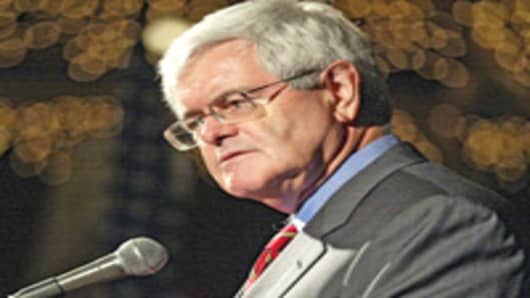A Newt Gingrich presidency would see sweeping tax cuts, "very serious deregulation" and stringent limits on unemployment benefits after four weeks, the outspoken conservative told CNBC.
As part of a five-point plan, the former House leader said he would eliminate the National Labor Relations Board, replace the Environmental Protection Agency and repeal the national health care plan, often called ObamaCare.
He said he would cut regulations on financial institutions, including eliminating the Sarbanes-Oxley law that governs accounting practices of publicly traded companies.
Amid all the tax-cutting and agency consolidations would come a return to a fiscal policy that he said emanates "directly from the Reagan playbook."
"I think these kinds of steps would move us toward a very dramatic job growth, which is the best way to move towards a balanced budget—by getting people off of unemployment, off of Medicaid, off of food stamps, get them back into earning a living and paying taxes," he said.
Gingrich's plan involves five tenets: no tax increases in 2013; eliminating the capital gains tax; allowing companies to deduct capital expenses fully; reducing the corporate tax rate to Ireland's rate of 12.5 percent; and abolishing the death tax.
Despite needing to plug a budget deficit approaching $1.5 trillionand a national debt 10 times that level, the Georgian firebrand said his plan would generate revenue through growth, not taxation.
"Washington would like to raise taxes because Washington would like to spend more money," he said. "The American people know this country is not undertaxed, this country is overspent."
Polls show Gingrich with some of the highest name recognition among what is expected to be a crowded field of Republicans challenging President Barack Obama in 2012.
Yet he also generally finds himself in the middle of the pack popularity-wise. The latest Gallup polls show him with just 6 percent of the vote among all Republicans, though two of the leaders, Donald Trump and Mike Huckabee, have said they are not running.
That places him behind former Massachusetts Gov. Mitt Romney, who is running, and former Alaska Gov. Sarah Palin, who has not made her plans clear yet.
Gingrich is banking on his conservative credentials to generate momentum, built during a tumultuous stint as Speaker under former President Bill Clinton. Despite intense acrimony between the two sides that included a government shutdown, Congress managed to pass a string of balanced budgets.
Most recently, though, Gingrich has found himself the target of ire from the right after he criticized Wisconsin Rep. Paul Ryan's deficit reduction plan.
In his CNBC interview, Gingrich moved to soften the criticism, praising Ryan for exhibiting "citizenship at its very best" on austerity. But he insisted that the plan's unpopularity made it untenable because "Washington shouldn't be imposing things on the citizens of the United States."
Gingrich said his focus would be on getting government out of the way of business by defunding the NLRB, which he criticized for pursuing a complaint against Boeing for moving a plant to South Carolina, a right to work state. He also said he would replace the EPA with an Environmental Solutions Agency.
On jobs, he said he would allow the unemployed to collect benefits for four weeks to look for a job, then would force recipients into a job training program.
"Instead of spending $140 billion a year for people to do nothing, you'd be spending most of that $140 billion retaining the American work force, making us more competitive in the world market, making us able to compete with China, Germany and India," he said.



